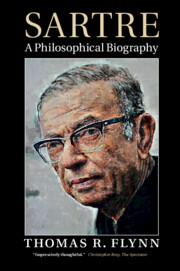Book contents
- Frontmatter
- Dedication
- Contents
- Preface
- Acknowledgments
- Abbreviations
- 1 The childhood of a genius
- 2 An elite education: student, author, soldier, teacher
- 3 Teaching in the lycée, 1931–1939
- 4 First triumph: The Imagination
- 5 Consciousness as imagination
- 6 The necessity of contingency: Nausea
- 7 The war years, 1939–1944
- 8 Bad faith in human life: Being and Nothingness
- 9 Existentialism: the fruit of liberation
- 10 Ends and means: existential ethics
- 11 Means and ends: political existentialism
- 12 A theory of history: Search for a Method
- 13 Individuals and groups: Critique of Dialectical Reason
- 14 A second ethics?
- 15 Existential biography: Flaubert and others
- Conclusion: the Sartrean imaginary, chastened but indomitable
- Select bibliography
- Index
- References
12 - A theory of history: Search for a Method
Published online by Cambridge University Press: 18 December 2014
- Frontmatter
- Dedication
- Contents
- Preface
- Acknowledgments
- Abbreviations
- 1 The childhood of a genius
- 2 An elite education: student, author, soldier, teacher
- 3 Teaching in the lycée, 1931–1939
- 4 First triumph: The Imagination
- 5 Consciousness as imagination
- 6 The necessity of contingency: Nausea
- 7 The war years, 1939–1944
- 8 Bad faith in human life: Being and Nothingness
- 9 Existentialism: the fruit of liberation
- 10 Ends and means: existential ethics
- 11 Means and ends: political existentialism
- 12 A theory of history: Search for a Method
- 13 Individuals and groups: Critique of Dialectical Reason
- 14 A second ethics?
- 15 Existential biography: Flaubert and others
- Conclusion: the Sartrean imaginary, chastened but indomitable
- Select bibliography
- Index
- References
Summary
In a footnote toWhat is Literature? Sartre muses: “Some day I am going to try to describe that strange reality History, which is neither objective, nor ever quite subjective, in which the dialectic is contested, penetrated, and corroded by a kind of antidialectic, but which is still a dialectic. But that is the philosopher’s affair” (WL 333–334). In fact, we have seen that from his youth, Sartre wished to be a philosopher and a literary person, both Spinoza and Stendhal. But if the two sides of his self-definition often existed in creative tension, the philosophical gene emerged as dominant in his later years. Sartre’s philosophical interest in the practice of history, as we observed, seems to have been sparked by the success of Raymond Aron’s defense and publication of two volumes on the philosophy of history for his state doctorate. Aron’s Doctorat d’état qualified him for a teaching post at the university level – something that Sartre never achieved, though he thought it within his reach if Jean Paulhan had only delayed publishing the manuscript of The Imaginary with Gallimard, a move that seemed to disqualifiy it as a thesis.
Whether or not one sees a dialectic at work in Being and Nothingness, we know that Sartre had dialectical thought on his mind when he criticized Dialectical Materialism but favored what came to be called “Historical Materialism,” in the closing passages of his first mature philosophical publication, Transcendence of the Ego (1936–1937). We witnessed dialectic come to the fore in his book Anti-Semite and Jew, where he distinguished analytic from synthetic reason and explicitly ascribed a decisive role to changing the “bases and structures” of choice to counter anti-Semitism. Dialectic figured centrally in his seminal essay “Materialism and Revolution” in which he attacked neo-Marxist “economism” as if the only “bases and structures” to be addressed were economic. He had not yet worked out the precise relation between transcendence and facticity bequeathed him by the ontology of BN, because he still considered “materialist dialectic” a contradiction in terms.
- Type
- Chapter
- Information
- SartreA Philosophical Biography, pp. 314 - 333Publisher: Cambridge University PressPrint publication year: 2014

